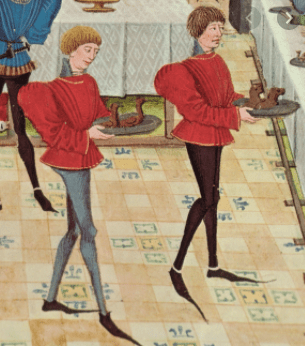When you’re learning a new language, prepositions seem nice and easy at first. But after a while they prove to be pesky little buggers, keen on causing mischief. That’s certainly true for Polish, currently my favourite nuisance. One of its mischievous prepositions is po, followed by the locative case. Its most frequent meaning is ‘after’ – but what an ‘after’ it is sometimes!
In English, John’s wife becomes John’s widow after John’s death. Not so in Polish. Here, after John’s death, John’s wife becomes the ‘widow after John’: wdowa po Janie. One sees the logic: post-John, she’s a widow. But ‘widow after John’ would most definitely raise a lot of eyebrows in English. And not only in English: I don’t know of any Germanic or Romance language where a widow is said to be ‘after’ her dead spouse. Nor a widower – let’s not forget the bereft men.
It doesn’t take dying. Much less tragic events have the same effect of creating an aftertime, so to speak. Eating jam will do. Drinking beer will do. Even unboxing a pair of shoes is enough. I’ll explain.
A Polish ‘jar of jam’, filled with the sweet stuff, is very similar to an English one: słoik dżemu, in which słoik is a jar, dżem is how Polish spells ‘jam’ and the u-ending means ‘of’. But a ‘jam jar’ is a different matter. A jam jar no longer contains jam, it’s beyond jam – it’s after its jam phase. So there’s po again: słoik po dżemie, ‘jar after jam’. The same with beer bottles and shoe boxes: they’re ‘bottles after beer’ and ‘boxes after shoes’. (Just so you can verify: Butelki po piwie, pudełka po butach.) These are just examples, of course.
What I don’t know is how Poles call jars, bottles and boxes that are waiting to be filled with jam, beer and shoes. Jars for jam – słoiki na dżem? Of perhaps they follow the deep-rooted Slavic tendency to create special adjectives: jammy jars – słoiki dżemowe? My impression is that both constructions are not exactly wrong, but neither are they standard. I’m happy to bow to superior wisdom though. And I’m well aware that over 40 million people have such wisdom.
I’m also not sure how far this ‘after’ logic can be stretched. For instance, you’ve nearly reached the end of this blogpost. Does that make you a ‘reader after blog’ (czytelnik po blogu)? Makes sense to me. Not to the Poles, alas.
****
(Update) Days after publishing the above, I came across another case where Polish can use its word for ‘after’ in a way that English can’t: with the word ślad, ‘trace’. ‘The dog’s traces’ can be translated quite literally as ślady psa, but it’s also possible to say ślady po psie, ‘the traces after the dog’. I’m not sure if there’s a semantic nuance here; when there are two options, there often is.




 It’s happened again. In spite of good resolutions, and before even making a full recovery from the previous bout, I’ve contracted a new language.
It’s happened again. In spite of good resolutions, and before even making a full recovery from the previous bout, I’ve contracted a new language.